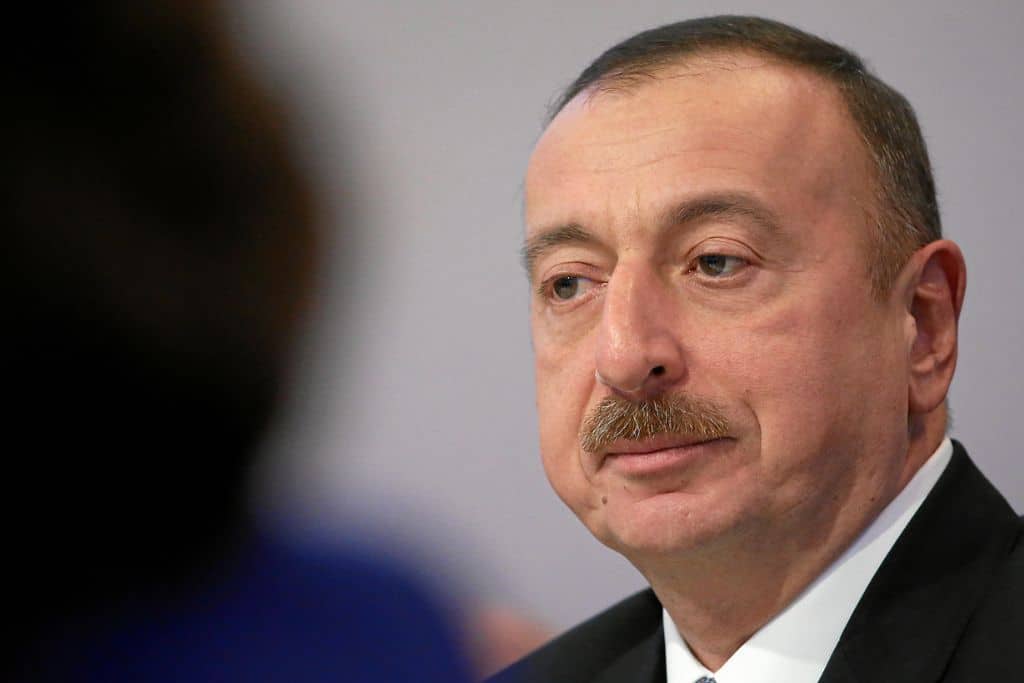Speaking at a conference in Germany, Azerbaijan President Aliyev confirmed the country’s plans to increase fossil fuel production in the coming years to meet demand from the European Union and other importing countries.
—
Azerbaijan, host of this year’s UN COP29 climate summit, will continue to invest in gas production in order to meet European Union demand for energy in what its president called a “sign of responsibility.”
The remarks were part of Azeri President Ilham Aliyev’s opening speech on the second second day of the Petersberg Climate Dialogue, a yearly international conference co-hosted by the German Foreign Office and the current COP presidency that brings together selected countries to prepare for the UN summit.
Citing an agreement between Azerbaijan and the European Commission, Aliyev said his country will increase its gas production and continue exporting its gas supplies to the EU “for many more years,” as the bloc seeks to break reliance on Russian gas. In 2023, Azerbaijan exported nearly half of its gas supplies to the EU, around 12 billion cubic meter. In December, the country said it was on track to nearly double that amount by 2027.
“… [W]e largely are investing in increasing our gas production because Europe needs more gas from new sources,” Aliyev said.
According to the International Energy Agency (IEA), oil and gas account for about 90% of its exports’ revenue and 60% of the government’s budget.
Addressing delegations from almost 40 states, Aliyev said his country is ready to take up responsibility for leading the year’s most important climate talks, set to take place in November in the capital Baku, adding that countries rich in oil and gas like his “should be in the front row of those who address the issues of climate change.”
The appointment of Azerbaijan, a highly fossil fuel-dependent state and the oldest oil-producing region in the world, reignited debates over the role of fossil fuels in the UN summit as it marked the third petrostate in a row to host the talks after the United Arab Emirates (UAE) last year and Egypt in 2022. Similar to last year’s talks, which were led by the head of the state-owned Abu Dhabi National Oil Company (Adnoc) Sultan Al-Jaber, the COP29 president-designate, ecology minister Mukhtar Babayev, worked at state-owned oil and gas company Socar for more than two decades.
In his speech, Aliyev criticized the media for centering their appointment’s coverage around the country’s reliance on fossil fuels, saying Azerbaijan will use the climate talks to “defend its right … to continue investments and production in fossil fuels.”
“Having oil and gas deposits is not our fault. It’s a gift of God,” he said. “We must be judged not by that but on how we use this resource for the development of the country, for reduction of poverty, unemployment and what is our target with respect to [the] green agenda.”
Azerbaijan’s climate targets, which include a 35% cut in greenhouse gas emissions by 2030 compared to 1990 levels, increasing to 40% by 2050, fall short of the net zero level the scientific community says is needed to avoid the worst consequences of climate change.
You might also like: Achieving Net Zero: Where Are We Today?
While the country is working on expanding its solar and wind capacity, which Aliyev said is expected to generate 2,000MW of electricity by 2027 and 5,000MW by 2030, its pledge to increase gas production contradicts the international community’s pledge to “transition away” from fossil fuels made at last year’s COP28 in Dubai.
This story is funded by readers like you
Our non-profit newsroom provides climate coverage free of charge and advertising. Your one-off or monthly donations play a crucial role in supporting our operations, expanding our reach, and maintaining our editorial independence.
About EO | Mission Statement | Impact & Reach | Write for us


















